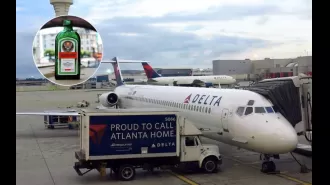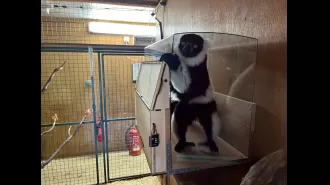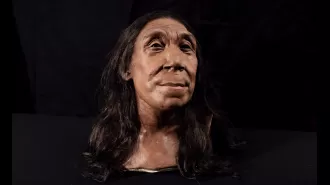Feral dogs are feasting on corpses in northern Gaza's roads.
Jabalya, northern Gaza: a scene of destruction and suffering, with bodies, ruined roads, and starving people.
October 17th 2024.

As the sun sets over Jabalya, northern Gaza, the streets are littered with bodies and the roads are destroyed from the recent Israeli strikes. The sight is devastating, and Fares Afana, the head of emergency services in the area, paints a grim picture of the situation. In a phone interview with CNN, he describes the signs of hunger and desperation on the faces of the people living in northern Gaza. According to him, the Israeli forces have destroyed everything that represents life or any signs of it.
Afana shares that it has become increasingly difficult for him and his colleagues to identify the bodies of the deceased, as some of them have been scavenged by hungry animals. He sadly reveals that even stray dogs, who are also struggling to survive, have resorted to feeding on the bodies in the streets. He even shares a heartbreaking photo of a young boy whose body was fed on by these animals.
The situation in Jabalya is dire, with thousands of children and pregnant women trapped in the besieged area. The Israeli military has been carrying out aerial and ground attacks in three neighborhoods for the past 12 days, claiming to target Hamas' presence in the area. As a result, over 50,000 people have been displaced from Jabalya, and those who remain are facing hunger and constant bombardment.
The UN has accused the Israeli military of forcing the residents of northern Gaza to make an impossible choice - either starve or leave. Philippe Lazzarini, the head of the UN's agency for Palestine refugees, stated that too many red lines have been crossed in Gaza, and the situation could still be prevented from escalating into war crimes. However, the Israeli agency responsible for managing aid into Gaza insists that they are not preventing the entry of humanitarian aid, with 30 trucks entering the north on Monday.
Despite the efforts to provide aid, Afana reveals that the situation is only getting worse. He shares that on Monday, Israeli forces fired on hungry residents who were searching for food at a warehouse aid center run by the UN. He also mentions that it is incredibly dangerous for paramedics to reach the area, as the roads are destroyed, and they are directly targeted by the Israeli military.
Afana himself has experienced the danger firsthand, as his ambulance was hit by shrapnel from Israeli artillery shelling near a hospital in Jabalya. He shares a video showing the aftermath, with crushed tires and bullet marks on the ambulance. The situation in Jabalya has been described as a real genocide by Afana, who adds that they are struggling to do their jobs in these dire circumstances.
CNN reached out to the IDF for comment on Afana's allegations of Israeli forces firing on emergency vehicles. As the conflict continues, the death toll in northern Gaza rises, with over 342 Palestinians killed and hundreds more injured. And on Tuesday, another 17 people lost their lives, according to Gaza's Civil Defense.
Abdul Karim Al-Zuwaidi, a journalist working in the besieged neighborhood, shares the devastation he has witnessed firsthand. In a voice message to CNN, he describes the scenes, sounds, and smells of the invasion as extremely violent. He also questions where the people of Jabalya can go, as their once lively refugee camp has been turned into a maze of demolished streets by Israeli bulldozers.
Al-Zuwaidi recalls the days before the war, where children played in the alleyways, and families gathered to celebrate holidays. He remembers the bustling markets and the feeling of peace and security in the camp. But now, all that remains are memories, as the camp is nothing but ashes. The people of Jabalya have lost their homes, their livelihoods, and their sense of safety. And as the bombings continue, they can only hope for an end to this devastation.
Afana shares that it has become increasingly difficult for him and his colleagues to identify the bodies of the deceased, as some of them have been scavenged by hungry animals. He sadly reveals that even stray dogs, who are also struggling to survive, have resorted to feeding on the bodies in the streets. He even shares a heartbreaking photo of a young boy whose body was fed on by these animals.
The situation in Jabalya is dire, with thousands of children and pregnant women trapped in the besieged area. The Israeli military has been carrying out aerial and ground attacks in three neighborhoods for the past 12 days, claiming to target Hamas' presence in the area. As a result, over 50,000 people have been displaced from Jabalya, and those who remain are facing hunger and constant bombardment.
The UN has accused the Israeli military of forcing the residents of northern Gaza to make an impossible choice - either starve or leave. Philippe Lazzarini, the head of the UN's agency for Palestine refugees, stated that too many red lines have been crossed in Gaza, and the situation could still be prevented from escalating into war crimes. However, the Israeli agency responsible for managing aid into Gaza insists that they are not preventing the entry of humanitarian aid, with 30 trucks entering the north on Monday.
Despite the efforts to provide aid, Afana reveals that the situation is only getting worse. He shares that on Monday, Israeli forces fired on hungry residents who were searching for food at a warehouse aid center run by the UN. He also mentions that it is incredibly dangerous for paramedics to reach the area, as the roads are destroyed, and they are directly targeted by the Israeli military.
Afana himself has experienced the danger firsthand, as his ambulance was hit by shrapnel from Israeli artillery shelling near a hospital in Jabalya. He shares a video showing the aftermath, with crushed tires and bullet marks on the ambulance. The situation in Jabalya has been described as a real genocide by Afana, who adds that they are struggling to do their jobs in these dire circumstances.
CNN reached out to the IDF for comment on Afana's allegations of Israeli forces firing on emergency vehicles. As the conflict continues, the death toll in northern Gaza rises, with over 342 Palestinians killed and hundreds more injured. And on Tuesday, another 17 people lost their lives, according to Gaza's Civil Defense.
Abdul Karim Al-Zuwaidi, a journalist working in the besieged neighborhood, shares the devastation he has witnessed firsthand. In a voice message to CNN, he describes the scenes, sounds, and smells of the invasion as extremely violent. He also questions where the people of Jabalya can go, as their once lively refugee camp has been turned into a maze of demolished streets by Israeli bulldozers.
Al-Zuwaidi recalls the days before the war, where children played in the alleyways, and families gathered to celebrate holidays. He remembers the bustling markets and the feeling of peace and security in the camp. But now, all that remains are memories, as the camp is nothing but ashes. The people of Jabalya have lost their homes, their livelihoods, and their sense of safety. And as the bombings continue, they can only hope for an end to this devastation.
[This article has been trending online recently and has been generated with AI. Your feed is customized.]
[Generative AI is experimental.]
0
0
Submit Comment





